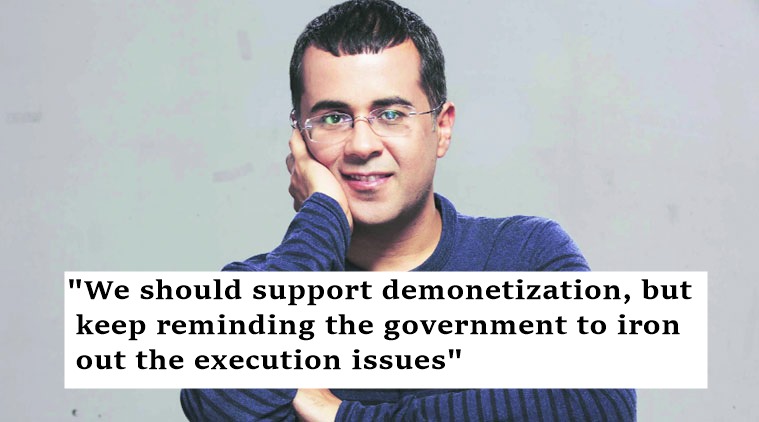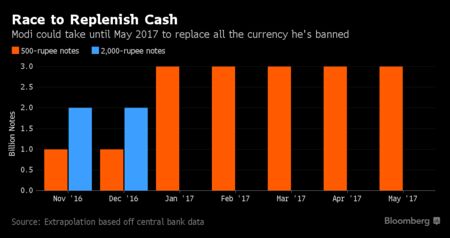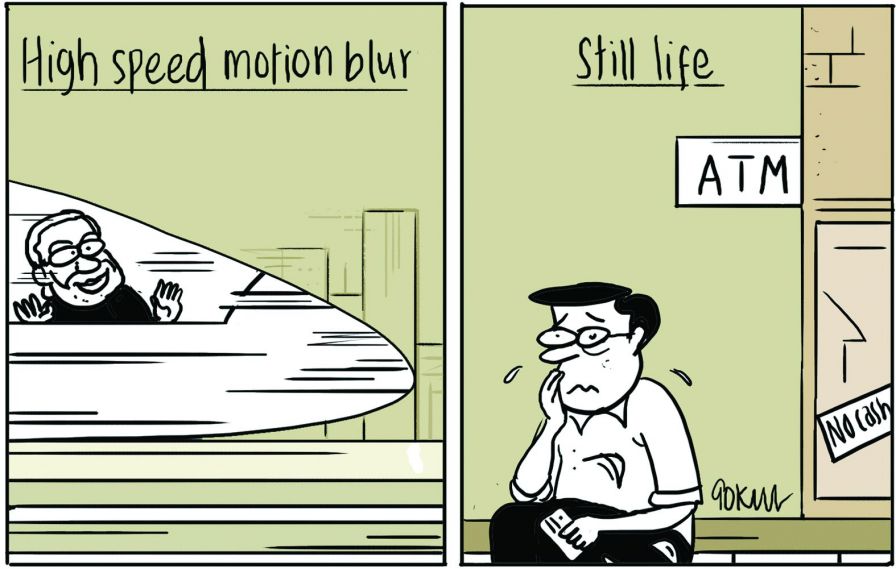Chetan Bhagat’s detailed Facebook post explaining demonetisation is a must read!
The author tries to make it easy for people to understand the government's move with his detailed Facebook post.
Published:November 17, 2016 12:02 pm
 The author tries to clarify people’s doubts about the government’s demonetisation process with his Facebook post. (Source: Wikimedia Commons) Everyone, or at least every Indian, has been losing their minds over demonetisation of late. People have been rushing towards the nearest ATMs and banks they can, resulting in long, never-ending queues starting from early morning hours.
The author tries to clarify people’s doubts about the government’s demonetisation process with his Facebook post. (Source: Wikimedia Commons) Everyone, or at least every Indian, has been losing their minds over demonetisation of late. People have been rushing towards the nearest ATMs and banks they can, resulting in long, never-ending queues starting from early morning hours.
In the midst of all this chaos, many took to social media to debate and discuss the issue. Among them, was author Chetan Bhagat, who first took to Twitter with his long rants against demonetisation. He called the government out for its poor execution of what is in fact, a well-meant plan for the people of the country.
Soon he took to Facebook too, but this time, with a detailed, point-by-point deconstruction of what the move is about, the benefits, the disadvantages and the execution. His intention was to give the people a lot more clarity about the unexpected move that was introduced by the PM recently.
Read his entire post here.
“My Take on Demonetization
========================
Many have asked me to give my views on demonetization, suggest any positive ideas and explain the benefits and issues in simple terms. Since it is not possible to do it all in a few tweets. Here is my take on it., both the MOVE itself as well as the EXECUTION of it.
THE MOVE:
Benefits:
1) It shows government’s seriousness to tackle black money. This signaling effect alone is a huge benefit to the nation where many evade taxes.
2) It will ensure a significant part of the black money gets back to the government. It’s not true that nobody gains from the money burnt/thrown away. (See next point)
3) The old money not swapped in banks is effectively the government’s Profit. Say 17 lakh crs of total money existed in old notes, and only 13 lakh crores comes back. For remaining 4 lakh crores, the government can print new notes, and keep it themselves. Hence, the government does stand to make a lot of money in this (which can be then used for people)
4) It’s nice to see a PM who works, has innovative ideas and wants to make a change. We have had leaders who sat quietly and did little. It is good to see a man of action.
At the same time, like any policy, there are some issues.
Issues:
1) Execution of such an exercise in India is no joke. We just aren’t technically ready to do this in a smooth manner. (That is why we are facing some execution issues, which I get into later.)
2) There are some tricks still people can use to swap black money into new money. It will reduce the amount of black money recovered.
3) There is a huge cash economy in India. It isn’t ‘black’. It’s just cash. To suck up so much liquidity will lead to a slowdown and losses for a lot of people, for no fault of their own. The slowdown in economic activity will cause lower profits, and in turn lower taxes for the government.
4) A potential crash in real estate prices. While some want property prices to fall, a huge drop can cause an economic shock, reduction in bank collateral values etc., again leading to a recession.
5) The exercise by definition involves everyone swapping their money after showing their credentials. In effect, everyone has to prove they are innocent and have clean money. This is somewhat invasive to citizens, and while there is no other way, it remains an issue.
6) The exercise would be expensive, and that cost needs to be taken into account.
7) It’s a jolt to our stable monetary system. Doing it again and again will cause people to lose confidence in our currency. It’s really a one-off, and even that destabliizes things.
8) The tax department may use it as an excuse to harass people later, with endless questioning about the extra bank entries.
Net Effect:
Overall, demonetization is a good move. Given the extent of black money in the country, and the tiny taxpayer base, something had to be done. It had to be drastic. It has been done now. We should now do what it takes to make it succeed.
THE EXECUTION:
As important as an idea is it’s execution. There clearly have been execution issues, causing pain to a lot of Indians who have wasted a lot of productive time in queues. While doing things for the nation is good, one need not have to suffer because of bad planning or someone not thinking things through. The good and bad of the execution are:
Good:
1. It’s happening, and still the country is chugging along. Banks across the country are slow, but doing their bit. There is no mass hunger, or calamity so far. Thank God.
2. Government is taking steps to ease the pain. The change in limits helps. The banks are also devising ways to manage the crowds.
3. People in India are on the whole, taking it well.
Bad:
1. Someone didn’t plan the logistics well – it is one thing to make an excel spreadsheet of number of bank branches and the people involved. It is quite another to when you deal with India’s reality on the ground. There are bottlenecks galore in this exercise – whether printing of notes, uncaliberated ATMs, or limits to the number of cash vans. One can say whatever about the secrecy required, but it seems that while finance professionals sat and spoke up in the meetings, industrial engineers and operations research experts probably did not to the extent required. We are seeing the fallout now.
2. Citizens do not have to take so much pain. Inconvenience is one thing, suffering quite another. To say bear it in the name of patriotism is not listening to the issue – the execution is not efficient. It is the same as how people say – “Oh, the temple is dirty, bear it in the name of God.” Sorry, God had nothing to do with it. The temple management didn’t keep the temple clean. Same ways, patriotism has nothing to do with the fact that someone didn’t plan the ATMs better or didn’t make the new 500-Rs note available early.
FINAL CONCLUSION AND IDEAS FOR SMOOTH EXECUTION:
In final analysis, we should support demonetization, but keep reminding the government to iron out the execution issues. Some ideas:
1. Online appointment booking for banks.
2. Easy forms, which can be pre-filled. Faster check-outs at banks.
3. Hiring interns at banks for short term, supervised by existing employees.
4. Opening banks 24 X 7 after new hires come in.
5. Supplying enough notes to banks as fast as possible.
6. Fixing the ATMs
7. Declaring one or two holidays (not for banks!) for people to get their finances in order
8. Removing withdrawal limits as fast as possible.
9. Having empathy for people in lines, from the highest levels of government.
10. Giving an incentive to people to come to the bank. A meal coupon would go a long way too.
I hope the above helps you understand demonetization better. I also hope you focus on the making the exercise work, which means supporting the idea and yet demanding better execution. It also means not to get sucked into any propaganda or political drama.
Do share with others if you think this will help people get some clarity on what is going on and what needs to be done.
God bless.
Thanks, love and Jai Hind,
Chetan Bhagat”
This is his Facebook post.
http://indianexpress.com/article/tr...aining-demonetisation-is-a-must-read-4379832/
The author tries to make it easy for people to understand the government's move with his detailed Facebook post.
Published:November 17, 2016 12:02 pm

In the midst of all this chaos, many took to social media to debate and discuss the issue. Among them, was author Chetan Bhagat, who first took to Twitter with his long rants against demonetisation. He called the government out for its poor execution of what is in fact, a well-meant plan for the people of the country.
Soon he took to Facebook too, but this time, with a detailed, point-by-point deconstruction of what the move is about, the benefits, the disadvantages and the execution. His intention was to give the people a lot more clarity about the unexpected move that was introduced by the PM recently.
Read his entire post here.
“My Take on Demonetization
========================
Many have asked me to give my views on demonetization, suggest any positive ideas and explain the benefits and issues in simple terms. Since it is not possible to do it all in a few tweets. Here is my take on it., both the MOVE itself as well as the EXECUTION of it.
THE MOVE:
Benefits:
1) It shows government’s seriousness to tackle black money. This signaling effect alone is a huge benefit to the nation where many evade taxes.
2) It will ensure a significant part of the black money gets back to the government. It’s not true that nobody gains from the money burnt/thrown away. (See next point)
3) The old money not swapped in banks is effectively the government’s Profit. Say 17 lakh crs of total money existed in old notes, and only 13 lakh crores comes back. For remaining 4 lakh crores, the government can print new notes, and keep it themselves. Hence, the government does stand to make a lot of money in this (which can be then used for people)
4) It’s nice to see a PM who works, has innovative ideas and wants to make a change. We have had leaders who sat quietly and did little. It is good to see a man of action.
At the same time, like any policy, there are some issues.
Issues:
1) Execution of such an exercise in India is no joke. We just aren’t technically ready to do this in a smooth manner. (That is why we are facing some execution issues, which I get into later.)
2) There are some tricks still people can use to swap black money into new money. It will reduce the amount of black money recovered.
3) There is a huge cash economy in India. It isn’t ‘black’. It’s just cash. To suck up so much liquidity will lead to a slowdown and losses for a lot of people, for no fault of their own. The slowdown in economic activity will cause lower profits, and in turn lower taxes for the government.
4) A potential crash in real estate prices. While some want property prices to fall, a huge drop can cause an economic shock, reduction in bank collateral values etc., again leading to a recession.
5) The exercise by definition involves everyone swapping their money after showing their credentials. In effect, everyone has to prove they are innocent and have clean money. This is somewhat invasive to citizens, and while there is no other way, it remains an issue.
6) The exercise would be expensive, and that cost needs to be taken into account.
7) It’s a jolt to our stable monetary system. Doing it again and again will cause people to lose confidence in our currency. It’s really a one-off, and even that destabliizes things.
8) The tax department may use it as an excuse to harass people later, with endless questioning about the extra bank entries.
Net Effect:
Overall, demonetization is a good move. Given the extent of black money in the country, and the tiny taxpayer base, something had to be done. It had to be drastic. It has been done now. We should now do what it takes to make it succeed.
THE EXECUTION:
As important as an idea is it’s execution. There clearly have been execution issues, causing pain to a lot of Indians who have wasted a lot of productive time in queues. While doing things for the nation is good, one need not have to suffer because of bad planning or someone not thinking things through. The good and bad of the execution are:
Good:
1. It’s happening, and still the country is chugging along. Banks across the country are slow, but doing their bit. There is no mass hunger, or calamity so far. Thank God.
2. Government is taking steps to ease the pain. The change in limits helps. The banks are also devising ways to manage the crowds.
3. People in India are on the whole, taking it well.
Bad:
1. Someone didn’t plan the logistics well – it is one thing to make an excel spreadsheet of number of bank branches and the people involved. It is quite another to when you deal with India’s reality on the ground. There are bottlenecks galore in this exercise – whether printing of notes, uncaliberated ATMs, or limits to the number of cash vans. One can say whatever about the secrecy required, but it seems that while finance professionals sat and spoke up in the meetings, industrial engineers and operations research experts probably did not to the extent required. We are seeing the fallout now.
2. Citizens do not have to take so much pain. Inconvenience is one thing, suffering quite another. To say bear it in the name of patriotism is not listening to the issue – the execution is not efficient. It is the same as how people say – “Oh, the temple is dirty, bear it in the name of God.” Sorry, God had nothing to do with it. The temple management didn’t keep the temple clean. Same ways, patriotism has nothing to do with the fact that someone didn’t plan the ATMs better or didn’t make the new 500-Rs note available early.
FINAL CONCLUSION AND IDEAS FOR SMOOTH EXECUTION:
In final analysis, we should support demonetization, but keep reminding the government to iron out the execution issues. Some ideas:
1. Online appointment booking for banks.
2. Easy forms, which can be pre-filled. Faster check-outs at banks.
3. Hiring interns at banks for short term, supervised by existing employees.
4. Opening banks 24 X 7 after new hires come in.
5. Supplying enough notes to banks as fast as possible.
6. Fixing the ATMs
7. Declaring one or two holidays (not for banks!) for people to get their finances in order
8. Removing withdrawal limits as fast as possible.
9. Having empathy for people in lines, from the highest levels of government.
10. Giving an incentive to people to come to the bank. A meal coupon would go a long way too.
I hope the above helps you understand demonetization better. I also hope you focus on the making the exercise work, which means supporting the idea and yet demanding better execution. It also means not to get sucked into any propaganda or political drama.
Do share with others if you think this will help people get some clarity on what is going on and what needs to be done.
God bless.
Thanks, love and Jai Hind,
Chetan Bhagat”
This is his Facebook post.
http://indianexpress.com/article/tr...aining-demonetisation-is-a-must-read-4379832/
Last edited:






